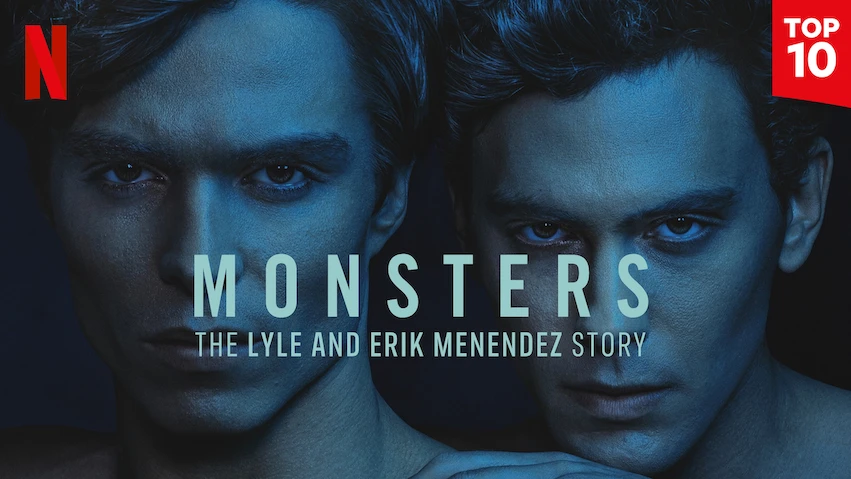Netflix in the past few years released highly trendy true crime documentaries and TV series about well-known killers like Ted Bundy, Jeffrey Dahmer, and the most recent one about the Menendez brothers. It is almost impossible not to realize how popular they have become. Audiences are going crazy about murderers, expressing fan behavior, empathy, or even fascination. Initially, women would send Ted Bundy nude photos, love letters, and even marriage proposals. Fast forward to the release of the Dahmer TV series, and just months later, people were dressing up as him for Halloween. Now, the Menendez brothers have become the latest obsession, with fans romanticizing them and advocating for their release from prison.
I am going to focus more on the latest crush of internet girls’ – the Menendez brothers. A few weeks ago Netflix released a TV series Monsters and a documentary called The Menendez Brothers about their case. The Menendez brothers are imprisoned for killing their parents when they were 19 and 20 years old, a tragic outcome stemming from years of alleged molestation by their parents. The fact that Netflix produced two separate pieces of content about the story highlights the true crime genre’s significance and widespread popularity among audiences, of which the majority is women.
Firstly, I did not watch the TV series after feeling somewhat shocked by the poster depicting two highly sexualized shirtless men almost suggesting gay behavior. I believe that Netflix, by intertwining true crime stories with elements of attraction, romance, and glamour to meet viewers’ entertainment needs, often crosses moral boundaries and diminishes the tragic aspects of these narratives. Consequently, the fact of killing is just ignored, girls on TikTok continue to confess love and attraction to murderers, seeing them rather as victims and not killers. According to research, people instinctively trust people they deem to be attractive – so it is difficult to watch true crime TV shows with good-looking actors and not stay on their side. Kim Kardashian and other celebrities also expressed their opinions supportive of freeing brothers from prison.

Secondly, the reason why this case became public again is TikTok. Content creators on that platform discovered video archives from the court proceedings related to the Menendez brothers’ case and started the discussion of freeing them from prison. The same videotapes are also widely presented in the Netflix documentary. My personal theory is that the case has gained popularity recently, in part due to the aesthetics and visuals of those archived materials. Video archives match current trends and aesthetics in fashion and visual representations of the 90s. I believe, content creators just find it (subconsciously) beautiful to use for their videos. In addition, they depict two attractive men in vulnerable positions, which may evoke empathy and sympathy in women.
The fascination with the Menendez brothers and similar true crime stories reveals a troubling trend in modern media. While Netflix combines sensationalism with attractive visuals, this approach raises moral questions about how we portray real-life tragedies. As audiences, especially young women, romanticize murderers, we risk desensitization to violence.
Platforms like TikTok reignite interest in these cases, often overshadowing the seriousness of the crimes. Celebrity endorsements for the Menendez brothers’ release can trivialize issues of violence and victimization. Ultimately, we must question why society is drawn to the allure of killers and remain aware of the real human suffering behind these narratives.
More statistics on true crime TV shows and movies.



This is so interesting!! It seems to me like every six months social media finds a new criminal to obsess over, and the infatuation actually leads to crazy places! Interestingly, this doesn’t just apply to romatisizing male criminals. The last boom (before the Menendez brothers) was a female – Gypsy Rose Blanchard. Social media can popularise anything and everything, but I also think the infatuation with criminals goes beyond that, it has always been a topic of interest. I don’t know what it is about human nature that gravitates towards such cases, but it’s a fact that we love being spooked. You’re right that it’s also very helpful to present these criminals as someone attractive to crush over – the glamorization on social media can do wonders when it comes to shifting the narrative. What could be more interesting than an attractive person with an ambiguous criminal history! I think it’s ridiculous how far the furor over these people goes, but I’m not sure it can be stopped – true crime community will always live on.
I agree that glamourizing crime is a really troubling trend/thing, but what also scares me is that it can also encourage people to commit crimes themselves, especially when criminals can become well-known through this. The creation of many documentaries like these about the criminals, wherein they are often being romanticized, can indeed (as you said/wrote) incite fascination and popularity amongst people for them. The glamourization, allure, and gain in popularity of killers through these kinds of documentaries, consequently create a reason for people to become criminals. Being able to become famous and glamourized through crime, to the extent that documentaries and movies can be made about said criminal/crime, is something I am deeply disappointed by.
I can vaguely remember that there was a teenager(?) in the United States (two years ago?) that committed a crime with a firearm, whom was also being glamourized online by netizens. This made my stomach turn a bit.
How the increase of (online) attention for a crime/criminal can motivate the criminal, can be seen in the Netflix documentary “Don’t F**ck with Cats: Hunting an Internet Killer”, which I (un)fortunately have already watched and is a less glamourized documentary about a criminal, albeit while still keeping said criminal’s name well-known.
A very interesting post, one that particularly intrigues me as well. An interesting phenomenon has definetly risen in the current digital social world. I believe that fixations and fascinations with serial killers and other similar people is something that predates the internet. For some reason people just cannot take their eyes away. The internet however adds a very intresting layer, we see so many “true crime” shows, youtube video, tik toks, etc… It definitely opens up a very interesting conversation on the ethics of profitting off of acts like murder. There is a gendered aspect to this phenomenon, perhaps, like you pointed out, due to the portrayal of these people that evokes empathy. But perhaps there is something more. It would be interesting to see what underligning factors causes this.
Great blog post and interesting topic! I have seen this phenomenon myself, especially on Tiktok. The amount of complications of the Menendez brothers is just insane en somewhat disturbing. I think it’s great that it sheds light on the case, because it’s really unfair what has happened to them. However, the sexualization of the brothers is just crazy to me. The same thing happened to Ted Bundy. We love to sympathize with attractive people. I don’t think this will change any time soon, but it is important to shed light on this. Directors need to keep this in mind when making documentaries.